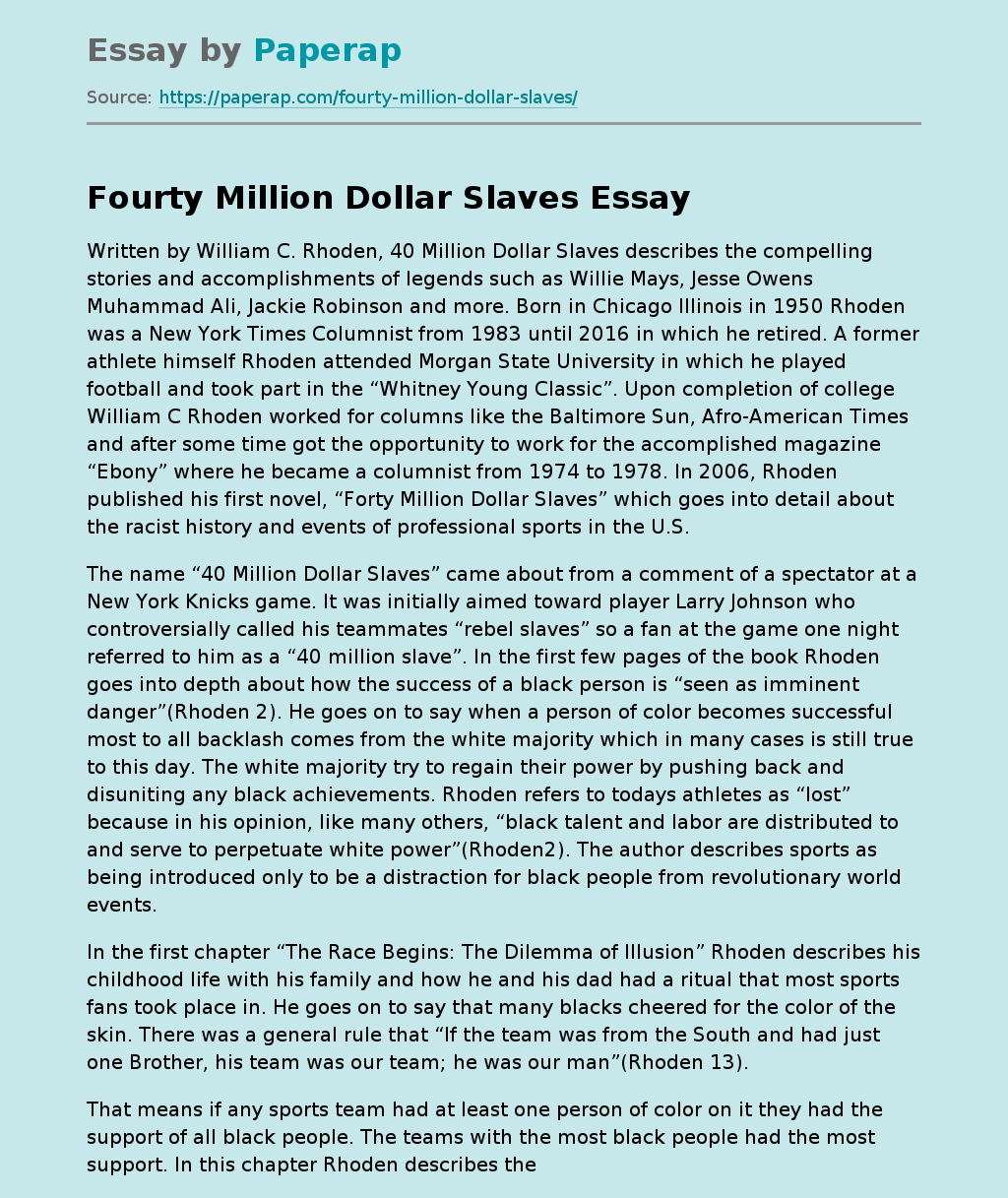Fourty Million Dollar Slaves
Written by William C. Rhoden, 40 Million Dollar Slaves describes the compelling stories and accomplishments of legends such as Willie Mays, Jesse Owens Muhammad Ali, Jackie Robinson and more. Born in Chicago Illinois in 1950 Rhoden was a New York Times Columnist from 1983 until 2016 in which he retired. A former athlete himself Rhoden attended Morgan State University in which he played football and took part in the “Whitney Young Classic”. Upon completion of college William C Rhoden worked for columns like the Baltimore Sun, Afro-American Times and after some time got the opportunity to work for the accomplished magazine “Ebony” where he became a columnist from 1974 to 1978.
In 2006, Rhoden published his first novel, “Forty Million Dollar Slaves” which goes into detail about the racist history and events of professional sports in the U.S.
The name “40 Million Dollar Slaves” came about from a comment of a spectator at a New York Knicks game. It was initially aimed toward player Larry Johnson who controversially called his teammates “rebel slaves” so a fan at the game one night referred to him as a “40 million slave”.
In the first few pages of the book Rhoden goes into depth about how the success of a black person is “seen as imminent danger”(Rhoden 2). He goes on to say when a person of color becomes successful most to all backlash comes from the white majority which in many cases is still true to this day. The white majority try to regain their power by pushing back and disuniting any black achievements.
Rhoden refers to todays athletes as “lost” because in his opinion, like many others, “black talent and labor are distributed to and serve to perpetuate white power”(Rhoden2). The author describes sports as being introduced only to be a distraction for black people from revolutionary world events.
In the first chapter “The Race Begins: The Dilemma of Illusion” Rhoden describes his childhood life with his family and how he and his dad had a ritual that most sports fans took place in. He goes on to say that many blacks cheered for the color of the skin. There was a general rule that “If the team was from the South and had just one Brother, his team was our team; he was our man”(Rhoden 13).
That means if any sports team had at least one person of color on it they had the support of all black people. The teams with the most black people had the most support. In this chapter Rhoden describes the story about Paul Robeson who was an All American football player with other talents such as acting and singing. During his first day as a freshman football player his white teammates tried to kill him and was almost successful. Despite his plea, his father refused to let him quit and once he realized what he was really doing it for he refused to quit either. He saw himself as the spokesperson for all young black people who wanted to play football.
Next Rhoden recounts the story of one of the greatest boxers of all time and a legend Cassius Marcellus Clay who later became apart of the Nation of Islam and changed his name to Muhammad Ali. Muhammad Ali became the first omnipresent black man meaning he was widely encountered and admired by many of both races.
In the next chapter William C Rhoden illustrates the life on a plantation. He characterizes things like sports, dance, and other musical forms as being “tools of survival”( Rhoden 53). Performing activities in a sense became a common form of communication and self expression. For some slaves, showcasing their talent and playing at events and gatherings secured privileges they would not otherwise have. Slaves were relied on for entertainment of guests and of the plantation owner. On a plantation there were two systems that described your status. The status given by the owner and the status amongst the slaves. “An accomplished athlete was one who eared status from both the plantation owners and the slave community.
For the remainder of the book, Rhoden touches base with things like appropriation and how athletes had to “bear the weight of a nations race consciousness”(Rhoden 151). People like Jackie Robinson, Miles Davis, Chuck Cooper, Earl Lloyd etc had to constantly stay on their Ps and Qs since they were some of the first people to integrate sports. For years black people have been behind the innovation in sports. Especially in basketball where they made things like the spin move and the alley-oop pass and creative dunks. “The African American presence in sports has redefined and reordered the traditional way of doing things.”(Rhoden 152)
The Author conveys the message that sports are just another way of being controlled by the superior race. If one decided to rebel he will basically lose everything. This can be seen in todays reality with Colin Kaepernick. Instead of standing for the flag like everyone else he decided to take a knee to protest the many injustices of black people at the hand of whites. Due to his peaceful protest he got backlash from the white majority saying it was “disrespectful to the troops”. The NFL is owned and ran by white people who disagreed with what he was trying to protest she they blackballed him from football. He hasn’t been able to play an NFL game since he started the protest.
his Athletes are often times considered “larger than life” simply put they are superstars thrust into the cut throat fast paced life of professional sports. In this book Rhoden details the lives popular successful athletes who faced scrutiny in sports like Muhammad Ali, Jackie Robinson, Arthur Ashe,
Rhoden states that: This book seeks to tell the story of the rise and fall of the black athlete but also to point the way toward redemption. It will seek to tell this exciting, rich, epic torso with honesty and respect for its complexities, but it will also be driven b a sense of purpose: to find in that history lessons that will help illuminate the still darkened path to real power for the black athlete”
In conclusion 40 Million Dollar Slaves was written from a perspective that can be told somewhat first hand. Rhoden was an athlete so he could understand to some perspective but yet he wasn’t a professional athlete so he could only speak from a media standpoint. I too am an African American student athlete.
Reading the book forced me to use another perspective of thought. I feel as though if I were more aware of the history of successes and struggles throughout African American history I would be more inclined to be more of an activist and use my position as a student athlete to uplift and educate my peers of the pitfalls and obstacles we as black men will face as we continue to survive in America.
Rhoden speaks about us as black athletes reaching our Promised Land, I gained valuable insight while reading 40 Million Dollar Slaves I couldn’t help but feel a bit disappointed in a sense because despite our known struggles we still continue to act negatively towards each other this book gave me valuable lessons that I only wish I knew growing up playing sports. We as a culture, a race, a group we need to full emerge ourselves in our heritage and lineage because was Spanish philosopher George Santayana stated “Those who cannot remember the past are doomed to repeat it.” After reading 40 Million Dollar Slaves and learning a piece of our history in sports his quote holds eerie truth, if fail to learn from what our forefathers were able to do for us then we will looked at nothing more than basketball players.
Fourty Million Dollar Slaves. (2021, Dec 14). Retrieved from https://paperap.com/fourty-million-dollar-slaves/

